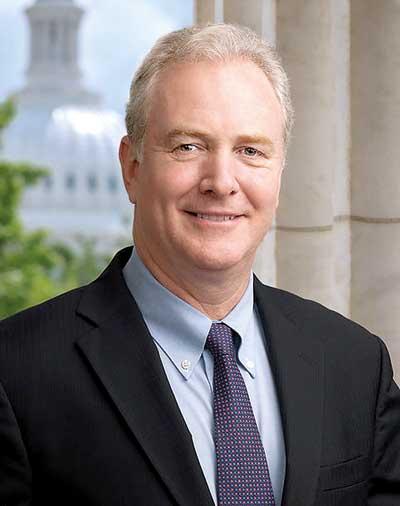04 Sep 2023 - {{hitsCtrl.values.hits}}
U.S. Senator Chris Van Hollen, at a media roundtable with a select group of journalists said Sri Lanka is emerging from the emergency, and his country is pleased to see the adoption of the Anti-Corruption Law. He took questions from the journalists. Excerpts:
to see the adoption of the Anti-Corruption Law. He took questions from the journalists. Excerpts:
 Q Sri Lanka underwent a lot of changes last year. There were massive protests demanding the President step down. Now after the current President came into power, the situation has completely changed. The democratic space has shrunk and people are asking for elections and the people’s democratic rights have been deprived. So, what is your observation on the present situation?
Q Sri Lanka underwent a lot of changes last year. There were massive protests demanding the President step down. Now after the current President came into power, the situation has completely changed. The democratic space has shrunk and people are asking for elections and the people’s democratic rights have been deprived. So, what is your observation on the present situation?
My understanding is that Sri Lanka will hold presidential elections next year, at the same time we’re going to be holding our presidential elections in the United States. It is very important that the people of Sri Lanka be given political space to express their views clearly; that the media feel free to report the news and different people’s views. So, that has been something that the United States has stood for. Despite all our political differences at home, one of the institutions that has held firm has been the press, and the freedom of the press is really important. And of course the freedom of the people to protest.
And as you indicated, the important economic transformation that’s taken place has been a direct result of the protests of the people of Sri Lanka. And it does seem in talking to people here that things are improving.
As I said, one of our hopes going forward, and this is connected to politics and the connection between politics and the economy, is that we’d also like to see more American investment in Sri Lanka. We met with our American Chamber of Commerce, AMCHAM. One of the things they mentioned was to try to create what we call a one-stop shop. A single window so that American and other companies wanting to invest in Sri Lanka can do it.
Sri Lanka. We met with our American Chamber of Commerce, AMCHAM. One of the things they mentioned was to try to create what we call a one-stop shop. A single window so that American and other companies wanting to invest in Sri Lanka can do it.
Obviously people are going to be watching closely what happens in terms of the economic improvement, but also to your point, the political situation. I think those go hand in hand.
Q When I read your biography, I noticed that you advocated equal opportunity for all. In Sri Lanka, because of this economic crisis, inequality has widened. There are vulnerable groups and all. What kind of help can the US extend for Sri Lanka to address this issue?
That has been one of chief parts of my platform at home, and I’ve tried to enact laws to increase greater opportunity for more people. So I do think it’s very important that -- let me back up.
I think the agreement with the IMF was very important to rescue the Sri Lankan economy, but I also think it’s important that as the IMF implements its programmes in partnership with the government of Sri Lanka, that they do it in a way that does not disproportionately impact the most vulnerable and the poorest.
So I think it’s very important that as the IMF works with Sri Lanka on the restructuring that they give special attention to the needs of the most vulnerable.
I understand that the next meeting is going to take place in September. Having observed these programmes around the world, our message to the IMF is work to implement this in a way that does not impact the most vulnerable.
One of the issues with the IMF restructuring is to address tax avoidance, because when you deal with debt, you want to make sure that those that owe taxes are paying their taxes so that you don’t have to make disproportionate cuts to those who are most vulnerable. That is obviously something that we look at.
You asked about my own platform. One of the things that I’m very focused on is making sure that the very wealthy pay their fair share of taxes as part of our budget process.
The other part of this obviously is the opportunities for young people. We had a great discussion with young people and I had a chance to meet and talk briefly with the Minister of Education about some of the efforts they’re undertaking. But I do think especially as we have more focus on the digital economy, ensuring that young people have the tools and access to the internet is going to be very, very important.
Q When we talk about corruption in Sri Lanka, recently Sri Lanka enacted this Anti-Corruption law that is part of this IMF reform programme. In your view, how effective is this piece of legislation in curbing or containing corruption?
I think the proof will be in the pudding, as we say. The proof will be in the implementation of the programme. I know that -- let me back up a moment.
I think it was very important that the anti-corruption legislation be passed. I think this is an important measure to provide the world with more confidence in the Sri Lankan economy and how it’s trying to manage the debt crisis. But again, we’ll have to see how it’s implemented, and the IMF, part of their periodic review is to determine whether or not the anti-corruption law is being implemented.
Q You said you discussed something about the investment climate in Sri Lanka for Americans. What is your own assessment of the investment climate in Sri Lanka and will you be encouraging American investments, especially in Colombo Port City?
I’ll be encouraging American investment. And the thing as you well know about the American system is that every company looks at the situation and economics and decides on its own, right? So what we will do is encourage American companies to look at the situation in Sri Lanka and make a determination about investment. But what we’ve said to -- the message to the Sri Lankan government is the best way to achieve that is to make sure that an American company making an investment can be certain about the stability; that they’ll be able to essentially get the benefit of their agreement; that things won’t change mid-stream, and they will also be looking very much at the question of transparency in the system.
And also this goes back to the point about the interconnection between investment and the political situation. I think US companies will be looking at whether or not the government of Sri Lanka is making progress on the fronts that we talked about earlier in terms of reform, reconciliation. These are all important contributing factors.
American companies -- and one practical thing I mentioned earlier, one practical thing we urge is speeding up the effort to open up a single window idea. That was a clear message from AMCHAM representatives.
Q We have still not released most of the state land. What assurance has been given? Any information whether they will do it faster?
My understanding -- this is just my understanding -- there has been some progress in returning some lands, but it is very much unfinished business, and it is important, I think, as part of the whole effort to bring the country back together, to address the land issues. So there’s that issue. There’s the issue of ensuring your local governance going forward. But these are all works in progress. We’re very closely observing what’s happening because I think all of those things feed into sort of the overall sense of the political situation and stability in Sri Lanka.
Q Because of the situation in the country and with China, we are not progressing debt restructuring?
Let me say one thing really important here. In the United States when it comes to the Congress, the Senate and the House, and their support for the IMF, it’s very important from our perspective that no single country gets a better deal than any other country. And so I think when it comes to the Paris Club and India, I think those creditors just want to make sure that they have the same arrangement as China gets. It would be inappropriate for China to try to cut a better deal for itself at the expense of the people of Sri Lanka because that, as you point out, is the timing of this issue. It’s going to be really important that Sri Lanka’s largest creditor does not try to use its leverage to its advantage in an overall agreement that is so important to the people and the economy of Sri Lanka.
Q I had one question on the Indo-Pacific. The US always calls for the free and open Indo-Pacific. Does this mean that the countries concerned should adhere to UNCLOS (UN Convention on the Law of the Sea) or else it is a different set of rules?
We want one set of rules for everybody. We want freedom of navigation. We want the sovereignty of every country including Sri Lanka to be respected. We want their EEZs or territorial waters to be respected and part of the support that we provided to the Sri Lanka Navy and others is to make sure that they can do everything they need to do to protect Sri Lanka’s sovereignty.
So our view is very clear. The same rules should apply to everybody.Whether it comes to a free and open Indo-Pacific or debt restructuring.
Q So will you be happy with the idea of Sri Lanka that it will work out a standard operating procedure, that is to set a common set of rules for all the countries. Will you be happy with that idea for Sri Lanka?
Again Sri Lanka has to make its own decisions. We respect their sovereignty in making their decisions. As I said, we want to make sure that everybody is treated equally.
08 Jan 2025 15 minute ago
08 Jan 2025 21 minute ago
08 Jan 2025 59 minute ago
08 Jan 2025 4 hours ago
07 Jan 2025 07 Jan 2025